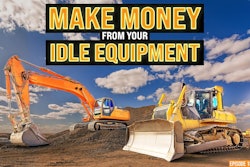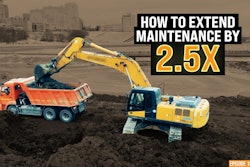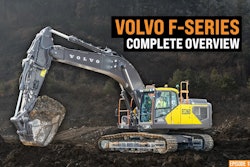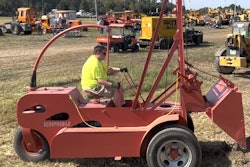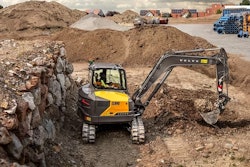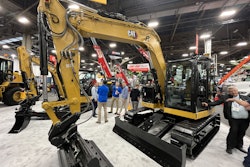Contractors often learn by trial and error when it comes to making equipment decisions, but there is a better way – and it’s not as complicated as you might expect.
On this episode of The Dirt, we hear from equipment industry consultant Steve Fooy who offers concrete steps to take before deciding whether to rent, buy or lease. The method removes the guess work and replaces it with facts in determining what will be best for your company.
He also offers suggestions on how to improve your equipment management skills and some tips for new contractors in need of equipment.
So to find out whether buying, renting or leasing is best for you and how to reach fact-based equipment decisions, check out the latest episode of The Dirt.
Equipment World serves up weekly videos on the latest in construction equipment, work trucks and pickup trucks – everything contractors need to get their work done. Subscribe and visit us at equipmentworld.com!
In This Episode:
- 00:00 – Should You Buy, Rent or Lease?
- 00:36 – How Do You Know Whether to Buy, Rent, or Lease?
- 01:36 – Existing Fleet
- 02:14 – Manufacturer Availability
- 02:54 – Capital and Operating Budgets
- 03:20 – Criticality of Equipment
- 03:50 – Cost Analysis
- 04:18 – Internal Rate vs. Market Rate
- 04:53 – Business Cycle
- 06:22 – Buying vs. Leasing
- 10:40 – New Contractors
- 14:44 – Resources for Contractors
- 17:27 – Final Thoughts
00:00:00:10 - 00:00:20:16
Bryan Furnace
Today we're here to talk about that age old question that everyone wants to know the answer to. Is it better to buy equipment, lease equipment, or rent equipment? And when does it make sense to do one over the other?
00:00:20:18 - 00:00:36:11
Bryan Furnace
Today we're talking to Steve Foy, and he's going to break some of this down for us and give us a little insight behind the decision making that goes on, especially with larger companies with larger fleets.
00:00:36:13 - 00:00:56:22
Bryan Furnace
So today, we're getting into the discussion that everybody wants to have, especially new business owners. The question is, is it better to buy equipment, rent equipment or lease equipment? So in what scenario would renting or leasing be more advantageous over just an outright buy of a piece of equipment?
00:00:57:00 - 00:01:18:09
Steve Fooy
Well, there's several different scenarios. I think first, one of the things that equipment managers and owners have to understand is what's in their budget. There's two different budgets that come into play here. You've got your capital budget, which is your purchasing of equipment, and you have your opex budget, which covers your day-to-day expense. When you purchase that, it falls under your capital.
00:01:18:11 - 00:01:38:18
Steve Fooy
And when you rent or lease, it normally falls under your operational budget. So first off, you have to understand there's two different issues going on there and understanding that will help you determine sometimes what direction you have to go. But I break it down. And the first one, it's pretty obvious, but you have to look at your own availability.
00:01:38:20 - 00:01:57:22
Steve Fooy
So it's kind of important that you take a look at your existing fleet and what kind of utilization are you running? Do you have some units with lower utilization that can be redeployed? Do you have ideal equipment? And one of the things that gets overlooked quite a bit is equipment that's being used in an application that require a different unit.
00:01:58:00 - 00:02:19:08
Steve Fooy
So for example, if I have a 70-yard loader doing an application where a three-yard loader would do the same thing, can I do some switching and redeployment? So maybe I don't have to rent or lease or even buy another piece of equipment. So I'd be the first thing. The next thing in under availability is what's the availability from the manufacturer?
00:02:19:10 - 00:02:38:20
Steve Fooy
What's the lead time? There are times where lead time specifically after Covid, where are they really stretched out. And my requirement was a lot sooner than I could get it from the manufacturer. So we would rent equipment to cover that gap. And this is where you can use a rental purchase option. I had an instance where I had to do this.
00:02:38:22 - 00:03:09:18
Steve Fooy
I rented it for a month under a rental purchase option. And another location that had capital dollars actually bought it. So that bridge, once again, that kind of bridge, that gap of, what I got for capital versus what I really needed. The second thing that's important, and I mentioned it before, is knowing your capital and operating budgets and what limitations to you have, and then having an understanding that rental and leasing can bridge that gap and actually conserve some of your capital dollars.
00:03:09:20 - 00:03:28:12
Steve Fooy
I always tell people, use all your money in both of your budgets, because that's one way that you can bridge the gap of some of the capital that you didn't get for the year. The third thing that I looked at was the criticality of your asset. How important is this to the financial success of your company or how special that equipment?
00:03:28:14 - 00:03:50:20
Steve Fooy
I know rental companies have gotten more into special equipment, but it's not necessarily always the equipment, but it's the attachments. So if that's the case, if it's critical to your operation, if it's critical to the success of not only your customer but you, that would lead you more to purchase or leasing where you have some ownership of that product.
00:03:50:22 - 00:04:15:00
Steve Fooy
The other thing I would do, number four, is do a cost analysis. This is kind of where the life cycle comes into play. And for me, I use that present value. And if I show a positive cash flow in my scenario, I'm leaning more towards purchasing and leasing. If it shows more of a negative cash flow, that might be an opportunity to look at rental or RPO.
00:04:15:02 - 00:04:43:10
Steve Fooy
So that would come into play. And number five kind of fits right into that. That's knowing your internal rate versus the market rate. So if I have knowledge of all my costs that will help me develop my internal rates that I have to charge job sites. If I know the market rates, I now can compare the two. So if my internal rate is closer to the market rate, that would lead me more towards renting.
00:04:43:12 - 00:05:09:08
Steve Fooy
If my internal rate is lower than the market rate, that would lead me more towards purchasing and leasing. Also, the next item I would look at would be the business cycle. Is it good? Is it improving? Is it decreasing? I mean, those are things that your ownership would know. Your commercial department would know. For goodness sakes, your budget will show it too, because if it's growing, they're more aggressive.
00:05:09:10 - 00:05:36:02
Steve Fooy
Then you know that you feel pretty good that the business climate is improving. If it's decreasing, then you have to ask some questions. If you're not familiar with the business condition. Where are we leading? And once again, that becomes a risk issue. And it could lead you to purchasing leasing rental RPO. It could lead to all those depending on the answer you're getting on the direction the business is setting.
00:05:36:04 - 00:06:00:15
Bryan Furnace
In my mind, there's two pieces to this conversation, and one you have kind of the purchase. And I would almost put lease kind of in the same bucket as the purchase. And where you have a little more ownership over the machine, whether it's a long-term ownership or short term. And then you've kind of got this rental option and and I'm 100% with you on specialty attachments that you're going to have a hard time getting your hands on.
00:06:00:15 - 00:06:21:05
Bryan Furnace
Absolutely. Go out and have those so that you're not relying on someone else to have that asset available for you. But the flip side is if you've got a very expensive attachment, it's only getting used a couple times a year. Once you do your cost benefit analysis, you might find my. That actually saves me a fair amount of money just to pay the little bit more for renting because we're only doing it 2 or 3 times a year.
00:06:21:11 - 00:06:40:05
Bryan Furnace
But where I kind of differentiate there is between buying and leasing. I know there's a lot of discussion on that because on the purchase side, you own it outright. You know your costs. You know, it's kind of you've got this nice, tidy little bow around this asset that you now own for better or worse, versus the lease option.
00:06:40:05 - 00:06:58:19
Bryan Furnace
I see a lot of guys that see that as being advantageous because, well, now all of a sudden, it's all under warranty. You've got someone else kind of taking over some of the bigger maintenance items. So in what scenario would you say leasing is better than mine? And what scenarios would you say that buying is better than leasing?
00:07:44:12 - 00:08:05:20
Steve Fooy
So you hear a lot of good things right there. I'll give you a good example. An attachment we bought. Attachment for a, excavator. Operations convinced me that this is the way to go, and we were running them on a regular basis, and it was quite expensive. And we could do some savings by buying the attachment, then owning it and utilizing it.
00:08:05:22 - 00:08:39:04
Steve Fooy
Unfortunately, the utilization didn't come through. So covering our costs didn't happen. So we actually sold it to the rental company that we ran it from and probably rented it back from them when it was required. So sometimes you miss and sometimes you had, but that does happen, and attachments can be an issue. Once again utilization is key because if you're estimating utilization and you don't hit it, then you're not covering or cost or you have to increase your internal rate to cover that cost for now is putting you closer over the market.
00:08:39:10 - 00:09:00:00
Steve Fooy
The other thing that you mentioned too, there is sometimes some confusion on what a lease and what a rental is, what the difference is between the two. You know, a lease is normally longer term. Normally you see leases that are three, five, seven, ten, 12 years. You can return it early, but there are significant penalties in doing so.
00:09:00:02 - 00:09:21:20
Steve Fooy
And the perception of ownership is with you. When you release something, you're the owner. All right. This is just a method of acquiring it. Rental is something different where I could rent it today at 1013 and return it at 1014, and there's no penalties, right? It's not mine. The perception of ownership is always with the rent or not with you.
00:09:21:23 - 00:09:43:21
Steve Fooy
And also you can include maintenance on both. You can have a lease with maintenance, and you can have a rental normally comes with some of that maintenance as well. For me when I choose one over the other, it had to do with what the internal rate was going to be. If I could buy it and my turtle rate was lower, that would probably be the direction I had as long as I had the capital.
00:09:43:23 - 00:10:05:08
Steve Fooy
Leasing was kind of a way to save on the CapEx side of my budget, but also a way of I wanted a little bit of both. So there were certain products I did want to lease because I would lease with maintenance, or it was going to be used on a job for a certain specific time. Let's say I had a job I knew was going to be three years, so I may lease that unit just for three years.
00:10:05:10 - 00:10:23:16
Steve Fooy
Also, leasing sometimes can provide you a lower rate. This is where you come in with residual values that play a role. And what you're what your lease rate's going to be. So there's a lot to it. I mean it's not just as easy as numbers on a page, right? I mean, you have to really dig into this sometimes to make the right decision.
00:10:23:16 - 00:10:39:01
Steve Fooy
And the decision you make today may not be the exact same one next year on the same scenario, things may change from application to applications, job to job. So you almost have to you do. You have to look at each case separately.
00:10:39:03 - 00:11:02:19
Bryan Furnace
What would you recommend? We've kind of talked for the most part so far about larger fleets, fleet managers that are maintaining, many pieces of equipment. What about for a small guy that's potentially going to go start his own company? He needs to get into that initial machine. Do you have any advice there on lease versus purchase versus RPO?
00:11:02:21 - 00:11:26:01
Steve Fooy
Yeah, I do. Any kind of new business opportunity, new customers, changing applications. I always look towards rental and RPO because there's some risk there, right? And I don't want to put all my eggs in one basket so I may start out rental. I do like rental purchase options because it gives you a good way to gain some your perception of equity and machine that you're running.
00:11:26:03 - 00:11:53:02
Steve Fooy
So almost everything that I in certain companies I work for, everything we rented was on an RPO. We just had an agreement with the vendors that this was the way it was going to be. These were the terms and conditions that we were going to use. And it helps you kind of conserve your capital, conserve your optics, or use your opex budget, but take some of that risk away, because if you buy it, there's a good chance you're going to have it for the useful life that you determined it to be.
00:11:53:04 - 00:12:02:04
Steve Fooy
Sure. And if you have to sell it early, you can take a loss. Or worst-case scenario, you could just have a settle on offense and not being used.
00:12:02:06 - 00:12:18:17
Bryan Furnace
I will say just general advice to the industry. There's so many guys that come into this and really, it's fly by the seat of your pants as you know how to pull the levers, and you know how to get the machine to the job. But the kind of paperwork side, the analysis side, there isn't a whole lot behind it other than let's go give it a shot.
00:12:18:18 - 00:12:44:05
Bryan Furnace
And I would say there is the huge advantage to coming into a company, having thrown some numbers down, whether it's in in Microsoft Excel or it's in you on your scratchpad, in your truck, throwing some numbers down and actually looking at what it would look like over a five-year period. Even if I purchase this machine with all of my maintenance costs associated, versus if I lease my machine like you, like you stated, what's my residual?
00:12:44:05 - 00:13:05:01
Bryan Furnace
What's going to be my buyback at the end? You know, having all of those numbers in front of you kind of take some of the mysticism out of that decision. Now you're looking at hard data, and you can sit there in your truck and say, okay, for me and my situation and what I think the next five years are going to be, this makes the most sense instead of just that shot in the dark.
00:13:05:03 - 00:13:25:01
Steve Fooy
That's a good point. I think a lot of us grew up in this industry with trial and error. I mean, we really did. And I think that's probably been, you know, there was some good lessons learned and there's some really hard ones learned as well. And I think now with technology and people like you, they're out there trying to expose people to the trades, equipment management.
00:13:25:01 - 00:13:48:05
Steve Fooy
It's very important. There's a there's a method to the madness. And now we can do some things, and we need to learn how to look at financial information. For example, in March I gave two presentations with ANP at their annual event and life cycle course. And it was two of a series of six. So I'm going to do one this October and their other meeting in Nashville.
00:13:48:07 - 00:14:09:18
Steve Fooy
And we're talking about life cycle, and we're using that present value. And the interesting part is, is in the scenario that we provided or I provided it really show the numbers, show that we should replace the equipment in 5 or 6 years. But the financial data showed that really the ten-year period was the right way to go.
00:14:09:19 - 00:14:10:11
Steve Fooy
So.
00:14:10:14 - 00:14:11:05
Bryan Furnace
Interesting.
00:14:11:07 - 00:14:28:16
Steve Fooy
You have to look at things in a couple different ways to try to make the right decision. And I think as people learn and go to, you know, expand their knowledge of this and all the tools that are out there, you can really make good business decisions quicker. And that's really what you want to be able to do.
00:14:28:16 - 00:14:43:09
Steve Fooy
You want good data that you can make good business decisions at a faster pace, because if you do that, you're going to be ahead of your competition. You're going to be ahead of other people that are doing the same thing. You're doing. So, I think you're right on with that, right?
00:14:43:10 - 00:15:01:03
Bryan Furnace
Well, let me kind of end on this note. Are there any resources you would recommend for guys who might want a little bit more of an education on, on some of the numbers? I don't want to say finances necessarily. That sounds scary, but just kind of going through and dissecting the numbers. Any resources you'd recommend?
00:15:01:05 - 00:15:28:10
Steve Fooy
Yeah, I mean, I've been involved with an organization called the Association of Equipment Management Professionals, ANP for short. They're in the business of helping equipment managers. I mean, this organization, which is managed by its membership, and it's really focused on construction equipment managers, and they do a lot of different things. I would invite, the people who view this to go to npr.org.
00:15:28:12 - 00:15:49:20
Steve Fooy
Look at some of the things they do. They have a couple of annual meetings. They have one in, March and one in October. I am doing for them some financial learning labs throughout the country. That's a two-day lab that just gives basic accounting information, basic budgeting information. And it's really, it's not an accountant discussing this.
00:15:49:20 - 00:16:13:14
Steve Fooy
It's equipment managers talking to another equipment managers about financing, accounting using our lingo, not accounting lingo, to try to figure out what's the best direction that you should go. And there was five of them this year. They'll probably be for next year. Those locations haven't been, selected yet, but they're interested in a learning lab. There's one in Saint Augustine on, November 6th and seventh.
00:16:13:16 - 00:16:36:12
Steve Fooy
And PNC Equipment Shift is in Nashville this year on the 16th through the 18th of October. And once again, I'm going to be presenting something on life cycle costs during that time frame. So I would look at the amp if you have any questions. Yeah, Rachel Connor is the key person. You can reach her at Rachel at aemp.org and she can provide all kinds of information.
00:16:36:12 - 00:17:06:12
Steve Fooy
The website's really easy to get around. They also do, certification classes. We just started one in August. It's a six-week course. You take a test. If you pass, you become a certified equipment managers, and there's some other certifications you can get as well. But that's the main one. Everyone wants to get so good sessions. I would say the last five, six years, we've really seen a lot of new memberships, coming in because people are tired of, learning by trial and error.
00:17:06:12 - 00:17:09:14
Steve Fooy
They want to hear; they want to hear other people's trial.
00:17:09:14 - 00:17:12:14
Bryan Furnace
And it's it's an expensive education.
00:17:12:16 - 00:17:19:21
Steve Fooy
But I would give that a try. That would be my advice as well as, what you're doing as well, Brian. I think it's very valuable.
00:17:20:02 - 00:17:25:07
Bryan Furnace
Well, thank you, Steve, for all of the information and the resources. Really appreciate your time this morning.
00:17:25:09 - 00:17:27:11
Steve Fooy
My pleasure. I appreciate the invite.
00:17:27:13 - 00:17:37:17
Bryan Furnace
Well, thank you again for Steve coming on the show to break down that age old question of rent, buy or lease. Hopefully this helps you and your business. We'll catch you on the next episode of The Dirt.
